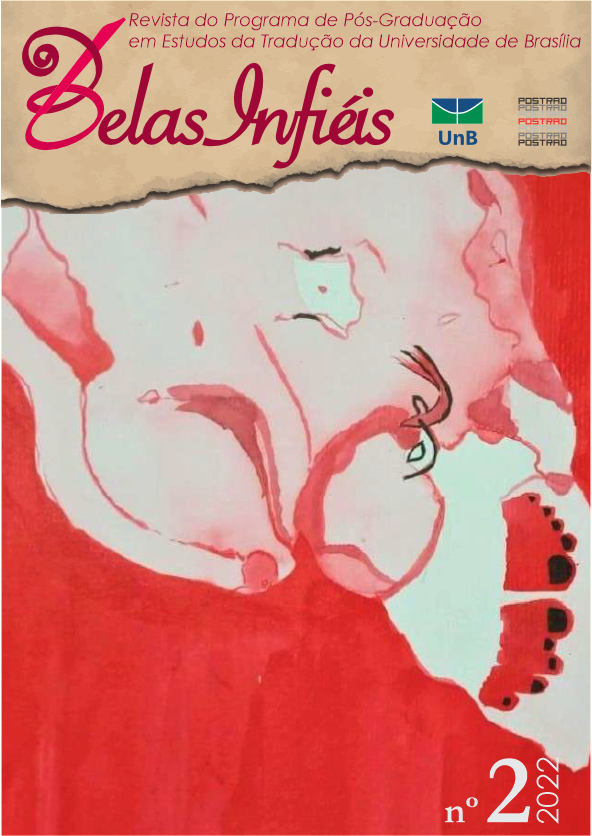(Se) créer, (se) réécrire, (se) traduire : postures littéraires et postures politiques chez des auteures et traductrices contemporaines
DOI :
https://doi.org/10.26512/belasinfieis.v11.n2.2022.43016Mots-clés :
postures d’auteur. e – discours littéraire – traduction – genre.Résumé
Le projet de recherche Crear(se), rescribir(se), traducir(se): posturas literarias y posturas políticas en autoras y traductoras contemporáneas (2020-2024), hébergé par le Laboratoire de Recherche en traductologie (LIT – IdIHCS – UNLP), étudie les mutations dans les pratiques et les discours littéraires contemporains à partir du concept de posture d’auteur.e (Meizoz, 2007, 2011) qui revient sur le fait littéraire et le décrit à la lumière des articulations constantes entre l’individuel et le collectif sous une approche sociologique. En accord avec ce développement critique et théorique, notre projet propose une analyse de l’émergence des tensions, rapports et constructions de soi présents dans les productions discursives d’auteures francophones et traductrices contemporaines qui cherchent à bouleverser le langage patriarcal et à revendiquer des idées féministes et politiques. La perspective théorique adoptée a rendu possible d’assumer un regard complexe porté sur le fait créateur et de faire appel à des concepts issus d’approches discursives, littéraires, traductologiques et sociologiques, tout en intégrant les dimensions rhétorique et discursive qui s’inscrivent dans la perspective de l’ethos discursif de Maingueneau (2004, 2015) et Amossy (2010, 2012) avec la dimension comportementale ou hexis corporel, selon Bourdieu (1980 [2017]). Le corpus analysé comprend des textes écrits par des auteures et traductrices qui ont marqué la littérature dans leurs langues d’écriture et de traduction : Aurora Venturini, Violette Leduc, Marguerite Duras, Laura Alcoba, Annie Ernaux, Joséphine Bacon, Natasha Kanapé-Fontaine et An Antane Kapesh.
Téléchargements
Références
Amossy, Ruth. (2010). La présentation de soi. Ethos et identité verbale. Paris: PUF.
Amossy, Ruth. (2012). L’argumentation dans le discours. Paris: Armand Colin.
Bourdieu, Pierre. (1980 [2017]). Le sens pratique. Paris: Éditions de Minuit.
Castro Vázquez, Olga (2008). Género y traducción: elementos discursivos para una reescritura feminista. Lectora, 14, 285-301.
Lefevere, André. (1992). Translation/History/Culture: a sourcebook. Londres y Nueva York: Routledge.
Lefevere, André. (1997). Translation, Rewriting and the Manipulation of Literary Fame. Londres y Nueva York : Routledge.
Maingueneau, Dominique. (2004). Le Discours littéraire. Paratopie et scène d’énonciation. Paris: Armand Colin.
Maingueneau, Dominique. (2015). Escritor e imagen de autor. Tropelías. Revista de Teoría de la Literatura y Literatura Comparada, 24 (2015), 17-30. Traducción del francés de Carole Gouaillier.
Meizoz, Jérôme (2007). Postures littéraires. Mises en scène modernes de l'auteur. Ginebra: Éditions Slatkine.
Meizoz, Jérôme. (2011). La Fabrique des singularités. Postures littéraires II. Ginebra: Slatkine Érudition.
Sporturno, María Laura. (2019). La conquista del espacio enunciativo. Un estudio de las notas en la traducción al español de Borderlands/La Frontera. Lengua y Habla (23). Universidad de los Andes, 360-379. Recuperado de: https://www.redalyc.org/journal/5119/511966657019/html/
Suchet, Myriam. (2010). Textes hétérolingues traduits: de «la langue» aux figures de l’énonciation. Pour une littérature comparée diferentielle. Montreal, Quebec, Canadá. Tesis doctoral presentada en el Centre for Interdisciplinary Studies in Society and Culture.
Téléchargements
Publié-e
Comment citer
Numéro
Rubrique
Licence
(c) Tous droits réservés CC BY 2022

Cette œuvre est sous licence Creative Commons Attribution 4.0 International.
Copyright Statement
Given the public access to this journal, the texts are free to use but requires the recognition of the original authorship and initial publication in this journal to be properly stated.
The journal allows the use of works published for non-commercial purposes, including the right to submit the work to publicly accessible databases. Published contributions are the sole and exclusive responsibility of the author(s).
- When submitting papers to be evaluated by the Belas Infiéis journal, the author(s):
- Declare that the contents of the contributions are original and of their original creation, being entirely responsible for their content if there is an objection by third parties.
- Claim to be aware that they should not commit academic plagiarism.
- Declare that the manuscript has not been published, completely or partially, in Portuguese or another language. If it is a translation it should be submitted to the Translated Articles section.
- Declare that the manuscript is not being evaluated by other journals.
- Declare that the manuscript was not submitted to another journal simultaneously.
- Commit(s) to inform the journal of any kind of error or inaccuracy in their contribution (published, in evaluation or in editing) and to collaborate with the editors to make due corrections of the article (when in evaluation or editing) or erratum/retraction (after publication).
- Declare that there is no conflict of interest regarding the published work.
- Authorize its release if it is accepted for publication without any kind of monetary compensation.
- Agree to assign non-exclusive rights to publication to the magazine, remaining free to make their contribution available in other media as long as the publication of the first version in Belas Infiéis magazine is mentioned. They also authorize Belas Infiéis to assign their texts for reproduction in content indexers, virtual libraries and similar platforms.
- Maintain copyright and grant the journal the right of first publication, the work being licensed under theCreative Commons Attribution License.
- Is/Are allowed and encouraged to publish and distribute their work online after the editorial process, which may increase the impact and citation of the published work.
- Authorize the editorial team to make textual adjustments and to adapt the article to the publication rules, when necessary.



















